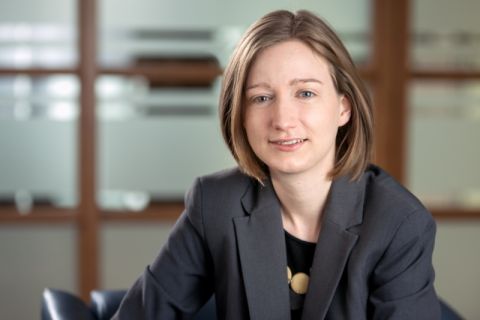
Since retiring as Chief Justice of Canada in 2018, the Right Honourable Beverley McLachlin has sat on Hong Kong’s Court of Final Appeal and on the Singapore International Commercial Court. Other Canadians currently sit on courts in the Caribbean. They are all part of a recent phenomenon in law: judges from common law jurisdictions being enlisted in foreign judiciary positions around the world. Professor Alyssa King is using a $27,370 Social Sciences and Humanities Research Council grant to dive more deeply into this phenomenon with her project, “Travelling Judges.”
“When judges retire or reach the mandatory age in their common law jurisdiction, they may be hired by courts in other jurisdictions,” she explains. “English judges do not even have to wait for retirement; they, too, may sit as ‘foreign’ judges on domestic courts such as the Hong Kong Court of Final Appeal, as well as special-purpose international commercial courts in countries such as Dubai and Kazakhstan.”
Focusing on transnational commercial litigation, King says her project will explore the role of foreign judges in two potential positions that retired judges often hold: work as a judge on a court, or work as an arbitrator, with a focus on commercial law. Judges can work as arbitrators at the same time as being a judge. King notes similarities between international commercial arbitrators, who have historically been “legal elites from a handful of countries” and “travelling judges.”
The genesis for the project came about a year ago after King wrote the paper, “Global Civil Procedure,” which has since been published in the Harvard International Law Journal. In it, she argues that while many procedures of transnational litigation and arbitration are the same, they vary in reason and purpose in different places. “It’s the same rule, but it ends up working out differently,” King says. Around the same time, Professor Pamela Bookman of Fordham Law School in New York was working on a paper about the rise of international commercial courts as co-operators with arbitration. After a meeting where the two discussed their work, and a successful SSHRC proposal later, King was on her way to finding out more about the motivations of the countries hiring foreign judges and the effects these judges have on the judiciary and norms of judicial independence. “We were seeing these different things happening, and we wanted to drill down on one part of this much bigger phenomenon, which is the actual people,” she explains.
Understanding the effects these judges have will in some way be connected to the motivations of the countries hiring foreign judges, King says. She predicts the research will reveal two broad categories of motivation: one, a credibility mechanism that helps invite investors and international business, where the countries are less concerned with what these judges decide and more concerned with their prominence in other jurisdictions and the confidence that they inspire; and two, a way to bring in expertise in the common law with a view towards legal change or modernization. “Those are two things that hiring countries can do, and I think it’s not either, or it’s probably both and in different balances in different jurisdictions, but we want to understand what the motivations are,” she says.
For the research, data will be collected and coded on foreign judges, including their numbers around the world and demographic information about them. King has enlisted the help of JD students for the data collection process. She and Bookman also hope to recruit some graduate students. “Queen’s and Fordham have graduate students from some of the jurisdictions that we’re interested in, and they can be of great help to us in terms of identifying courts that we’ve missed, or ways to think about what’s going on, and the politics of hiring these judges that we’ve missed because we’re not local experts and they are,” King explains.
The project will result in various law articles, which King hopes will shed light on the topic for numerous parties, including comparative law experts who can look at not just the borrowing of case law but also the “borrowing” of judges themselves, as well as the countries that both hire and send judges to serve in foreign judicial positions. “If you’re a sending state, do you want to set any limits? If you’re a receiving state, who do you want to choose and do you want to tighten your rules around conflicts?” she asks.
“There is some nervousness now,” King says, discussing debates over judges from the U.K. and Canada continuing to serve in Hong Kong, “I think that it is fair to raise the question about whether Canada should have any limits on judicial service for ex-judges, the same way that we have limits on their ability to be advocates. I’m not sure what I would conclude.”
By Geena Mortfield